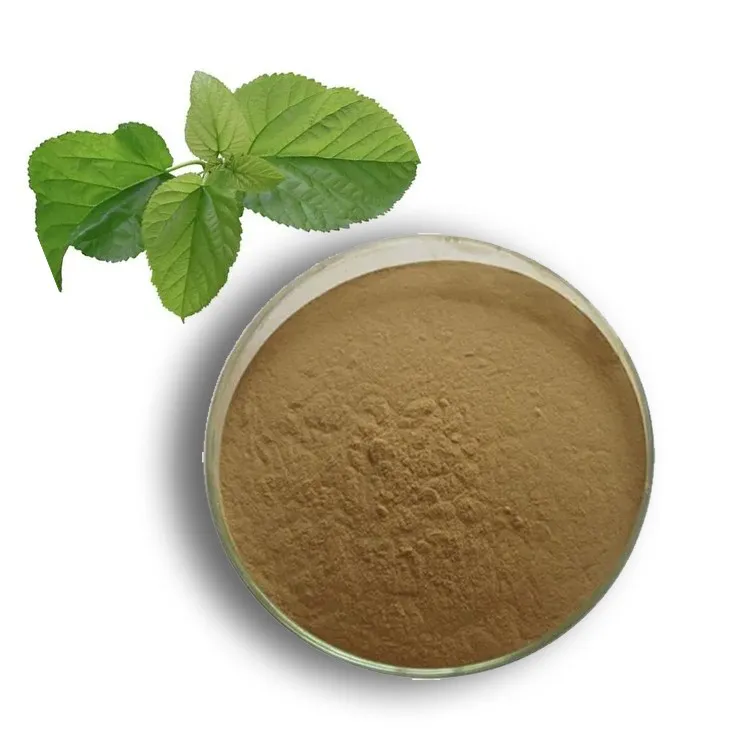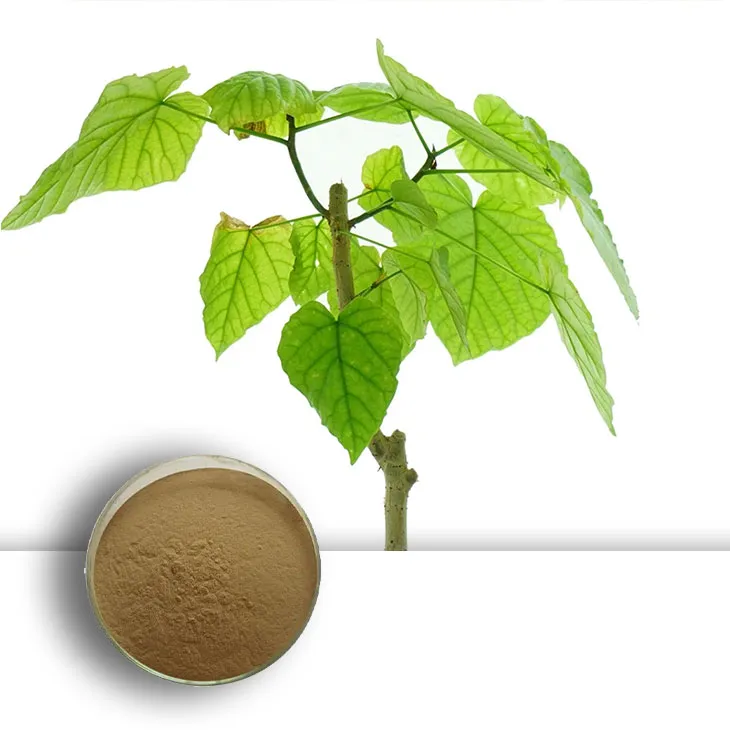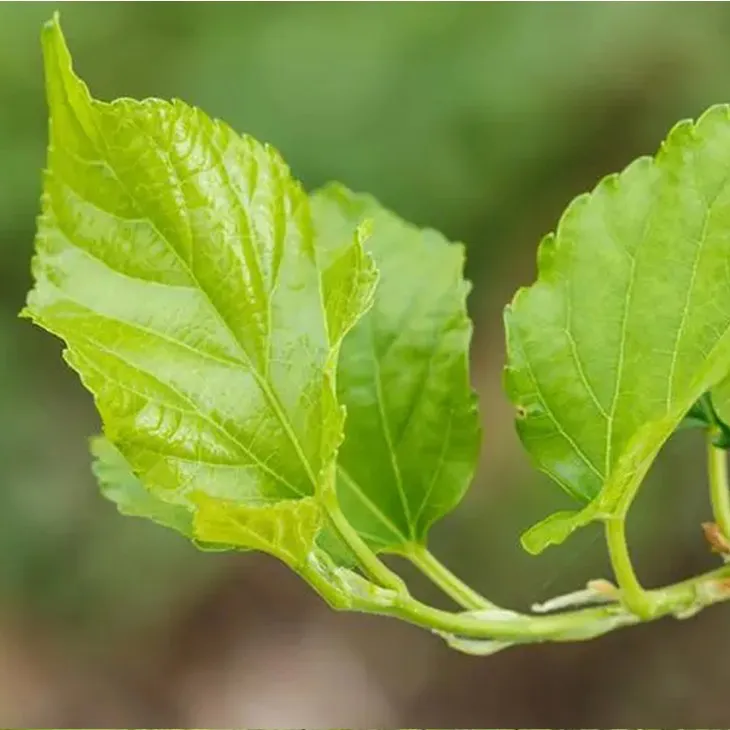- 0086-571-85302990
- sales@greenskybio.com
A Leaf of Tradition: Mulberry Leaf Extract in Historical Medicine Practices
2024-07-04

1. Introduction
Mulberry leaves have long been an important part of traditional medicine across the globe. Their use dates back to ancient times, and the knowledge of their medicinal properties has been passed down through generations. Mulberry leaf Extract has a rich history of use in treating various ailments, and understanding this history can provide valuable insights into the development of medicine as a whole.

2. Historical Context of Mulberry Leaf Use in Medicine
2.1. Ancient Chinese Medicine
In ancient Chinese medicine, mulberry leaves were highly regarded. They were used in the treatment of diabetes, a condition known in traditional Chinese medicine as "Xiao Ke." The leaves were believed to have the ability to regulate blood sugar levels. Records from ancient medical texts show that practitioners would often prescribe mulberry leaf preparations for patients with symptoms related to diabetes. For example, the "Shennong Ben Cao Jing," one of the earliest Chinese materia medica, mentioned the use of mulberry leaves for certain health conditions.
2.2. Traditional Indian Medicine
In Ayurveda, the traditional medicine system of India, mulberry leaves also had their place. They were used for their anti - inflammatory properties. Ayurvedic physicians would use Mulberry leaf Extracts to treat skin inflammations and joint pain. The leaves were often prepared as poultices or decoctions for external and internal use respectively. It was thought that the natural compounds present in the leaves could help soothe irritated tissues and reduce swelling.
2.3. European Herbal Medicine
In Europe, during the Middle Ages and the Renaissance, herbal medicine was a prominent form of medical treatment. Mulberry leaves were part of the herbal pharmacopoeia. They were used mainly for respiratory problems. Herbalists would recommend inhaling the steam from a decoction of mulberry leaves to relieve coughs and congestion. Additionally, the leaves were sometimes used in the form of a tea to soothe sore throats.

3. Knowledge Passed Down through Generations
3.1. Oral Traditions
In many cultures, the knowledge of mulberry leaf's medicinal value was passed down orally. Grandmothers and village elders would share their experiences and remedies with the younger generations. For instance, in some rural areas in Asia, they would tell stories about how mulberry leaves could be used to treat minor fevers or digestive problems. These oral traditions ensured that the basic knowledge of the plant's medicinal uses was not lost, even in the absence of written records.
3.2. Family Herbal Practices
Families with a long - standing tradition in herbal medicine would pass on their knowledge from one generation to the next. In these families, specific recipes for Mulberry leaf Extracts were carefully guarded. For example, a family might have a unique way of preparing a mulberry leaf tincture for use in treating menstrual cramps. The younger members of the family would learn the proper harvesting time of the leaves, the correct methods of extraction, and the appropriate dosage for different conditions.

4. Current Understanding of the Biological Activities of Mulberry Leaf Extract
4.1. Antioxidant Properties
Modern scientific research has shown that mulberry leaf extract is rich in antioxidants. Antioxidants play a crucial role in protecting the body from oxidative stress. Oxidative stress is caused by an imbalance between free radicals and antioxidants in the body, and it can lead to various diseases such as cancer, heart disease, and neurodegenerative disorders. The antioxidants in mulberry leaf extract, such as flavonoids and phenolic compounds, can neutralize free radicals, thereby reducing the risk of these diseases.
4.2. Anti - Diabetic Effects
Continuing the ancient belief in its use for diabetes, current research has found that mulberry leaf extract can indeed have a positive impact on blood sugar control. It contains compounds that can enhance insulin sensitivity and regulate glucose metabolism. In animal studies, it has been shown that mulberry leaf extract can lower blood glucose levels. Clinical trials on humans are also being conducted to further explore its potential as an adjunct treatment for diabetes.
4.3. Anti - Inflammatory Activity
Just as in traditional medicine, modern studies have confirmed the anti - inflammatory properties of mulberry leaf extract. The extract can inhibit the production of inflammatory mediators in the body. This makes it potentially useful in the treatment of chronic inflammatory diseases such as arthritis and inflammatory bowel disease. It can also be used topically for skin inflammations, similar to its traditional use in Ayurveda.
5. Importance of Mulberry Leaf Extract in Medical History
The use of mulberry leaf extract in historical medicine practices is a testament to the power of traditional knowledge. It shows how our ancestors were able to observe and utilize the natural world around them for medicinal purposes. Understanding the historical use of mulberry leaf extract can also inspire modern medical research. By looking back at the traditional uses and then validating them with modern scientific methods, we can discover new drugs or therapies. For example, the anti - diabetic properties of mulberry leaf extract could lead to the development of new drugs for diabetes treatment. Moreover, the long - standing use of this extract in different cultures around the world highlights the universality of the search for natural remedies and the importance of cross - cultural exchange in the field of medicine.
6. Conclusion
In conclusion, mulberry leaf extract has a long and storied history in medicine. From ancient Chinese, Indian, and European medical practices to modern scientific research, its importance has endured. The knowledge passed down through generations about its medicinal value has provided a foundation for our current understanding of its biological activities. As we continue to explore the potential of mulberry leaf extract in modern medicine, we should also remember and respect its rich historical heritage.
FAQ:
1. What are the main traditional medicine systems that value mulberry leaf extract?
Traditional Chinese Medicine (TCM) is one of the main systems that highly values mulberry leaf extract. In TCM, mulberry leaves have been used for centuries for various health conditions. Ayurveda, the traditional medicine system of India, also recognizes the potential of mulberry leaves. Additionally, in some traditional medicine practices in Southeast Asian countries, mulberry leaf extract has been part of their medicinal knowledge.
2. How was the knowledge of mulberry leaf extract's medicinal value passed down through generations?
The knowledge was mainly passed down through oral traditions and written medical texts. In many cultures, experienced herbalists and traditional medicine practitioners would teach their apprentices about the uses of mulberry leaves. Written records, such as ancient medical scriptures in different languages, also played a crucial role. For example, in China, there are numerous ancient medical books that document the use of mulberry leaf extract, which were studied and passed on from generation to generation.
3. What are the historical applications of mulberry leaf extract?
Historically, mulberry leaf extract has been used for treating respiratory problems. It was often used to relieve coughs and soothe inflamed throats. In some cultures, it was also used for treating skin diseases. For example, poultices made from mulberry leaves were applied to skin rashes. Another historical application was in the treatment of diabetes. There were traditional beliefs that mulberry leaf extract could help regulate blood sugar levels.
4. What is the current understanding of the biological activities of mulberry leaf extract?
Currently, it is known that mulberry leaf extract contains various bioactive compounds. These include flavonoids, alkaloids, and polysaccharides. Flavonoids in the extract have antioxidant properties, which can help protect cells from oxidative damage. Alkaloids may have potential effects on blood sugar regulation, which is in line with its historical use for diabetes. Polysaccharides are believed to have immunomodulatory effects, potentially enhancing the body's immune system.
5. Why is mulberry leaf extract important in the context of medical history?
Mulberry leaf extract is important in medical history because it represents the long - standing relationship between humans and plants for medicinal purposes. It shows how different cultures independently discovered and utilized the potential of this plant extract. Its historical use also provides a basis for modern research, as scientists can study the traditional applications and try to understand the underlying mechanisms, which may lead to the development of new drugs or therapies.
Related literature
- The Medicinal Use of Mulberry Leaves in Traditional Chinese Medicine"
- "Mulberry Leaves in Ayurvedic Medicine: A Review of Historical and Current Practices"
- "Historical Perspectives on Mulberry Leaf Extract in Southeast Asian Traditional Medicine"
- ▶ Hesperidin
- ▶ Citrus Bioflavonoids
- ▶ Plant Extract
- ▶ lycopene
- ▶ Diosmin
- ▶ Grape seed extract
- ▶ Sea buckthorn Juice Powder
- ▶ Fruit Juice Powder
- ▶ Hops Extract
- ▶ Artichoke Extract
- ▶ Mushroom extract
- ▶ Astaxanthin
- ▶ Green Tea Extract
- ▶ Curcumin
- ▶ Horse Chestnut Extract
- ▶ Other Product
- ▶ Boswellia Serrata Extract
- ▶ Resveratrol
- ▶ Marigold Extract
- ▶ Grape Leaf Extract
- ▶ New Product
- ▶ Aminolevulinic acid
- ▶ Cranberry Extract
- ▶ Red Yeast Rice
- ▶ Red Wine Extract
-
Grape Leaf Extract
2024-07-04
-
Dandelion Root Extract
2024-07-04
-
Hawthorn powder
2024-07-04
-
Red Wine Extract
2024-07-04
-
Calendula Extract
2024-07-04
-
Red Vine Extract
2024-07-04
-
Cassia Seed Extract
2024-07-04
-
Grapefruit Seed Extract Powder
2024-07-04
-
Curcumin Extract
2024-07-04
-
Acerola Extract
2024-07-04





















